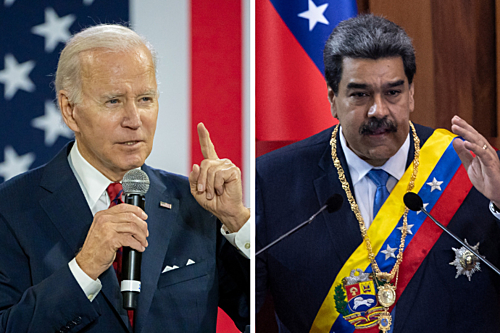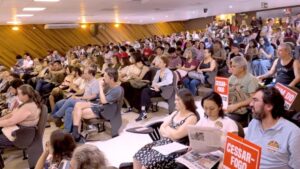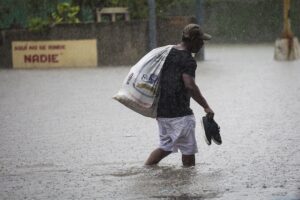
With no official diplomatic ties for four years, the US and Venezuela are likely to enter a new phase of relations influenced not only by energy supply and demand altered by the war in Ukraine, but also by the internal divisions of the Venezuelan opposition.
The end of the “interim government” of former deputy Juan Guaidó, decided by the parties that were allies of the “self-proclaimed president”, buried the right-wing parallel strategy in Venezuela that, since 2019, had been betting on destabilization and coup attempts, which counted on the support of former US President Donald Trump to overthrow the Venezuelan government.
Despite still trying to maintain a parallel Parliament, this sector of the opposition is increasingly facing internal divisions that tend to deepen now with the start of a primary process that seeks to define a unified presidential candidacy for the elections scheduled for 2024.
Abroad, the failure of the “interim” is already beginning to show its consequences, creating political, economic and diplomatic vacuums in parallel instances that were created by the opposition and assumed as official by several countries.
In the US, the future of the Venezuelan embassy in Washington is uncertain. According to several North American and European newspapers, the US government placed the diplomatic headquarters in custody on February 6th. The measure took place after Guaidó’s allies who held fictitious posts of “diplomats of the interim government” left their positions.
Despite the decision being backed by the Vienna Convention, which obliges the State receiving the embassy to protect its assets while it is unoccupied, it should only be resolved when the countries resume relations or decide to reciprocally give up their diplomatic headquarters.
::What’s happening in Venezuela::
Political scientist Ricardo Seitenfus, a foreign policy specialist and former employee of the Organization of American States (OAS), explains to the Brazil in fact that, although legal, the situation cannot be permanent.
“The idea is to preserve the material assets, the archives, the embassy building itself until this situation is resolved. This situation cannot last indefinitely, because one day there will be the closing of the embassy, the confiscation of the embassy, or the resumption of relations diplomacy,” he says.
Seitenfus, however, points out that a solution for the fate of both embassies, in Washington and in Caracas, could involve a third State as a mediator.
“There is also the possibility that the two governments, the United States and Venezuela, appoint a third State to represent their interests. It must be a country chosen by common agreement, but this implies a certain diplomatic dialogue that is not taking place now “, he states.
Washington se move
Faced with instability within the Venezuelan opposition and needing to dialogue with Caracas in search of oil, Washington tries to move to defend its interests, avoiding high internal political costs with more conservative Democrat and Republican sectors.
For Alex Main, international director of the US Center for Research on Economics and Politics (CEPR), the conduct of President Joe Biden’s government’s foreign policy towards Venezuela “creates openings” that did not exist during the “maximum pressure” policy. adopted by Trump.
“There’s a shift in the Biden administration’s strategy, because they’re not supporting the same radical sections of the opposition that the Trump administration was supporting. So I think that creates some openings. But at the end of the day, it remains problematic that the United States States have so much control over what should be a sovereign internal political discussion”, he says.
Former US President Donald Trump/Joe Raedle/Getty Images via AFP
To the Brazil in factMain says that internal problems in US politics, however, continue to influence the White House’s relationship with Caracas and may delay clearer measures for rapprochement.
::USA accepts end of Guaidó’s “presidency” in Venezuela, but still does not recognize Maduro::
“Not recognizing the government that is really running the country is an extremely unproductive policy that hurts Venezuela and the United States and is solely based on domestic political considerations. Biden’s concerns are with Florida politics and some conservative members of Congress “, he points out.
Despite this, the White House does not show signs that it would be willing to massively eliminate sanctions against Venezuela. In November last year, a general license issued by the US Office of Foreign Assets Control (OFAC) allowed Chevron to return to operating in the mixed plants that it owns jointly with Venezuela’s state oil company, to PDVSA.
The decision was the first important relief in the blockade since the toughest coercive measures were imposed in 2014. However, Venezuelan financial assets and assets abroad remain blocked, the country’s debt remains frozen and PDVSA continues with several trade restrictions and financial.
Citgo, Mexico and elections
In the US, the most serious case of freezing Venezuelan assets is the network of refineries and service stations owned by Citgo, a subsidiary of the state-owned PDVSA that came under the control of the opposition in 2019. Valued at around US$ 10 billion, the company is threatened by the US court to be liquidated to indemnify Venezuela’s private creditors.
“Until now, the United States has taken measures to protect these assets, but to the benefit of the Venezuelan opposition, with the expectation that if the opposition regained power it would be able to recover Citgo,” explains Main.
The researcher, however, believes that “there is a strong consensus among Venezuelans not to allow Citgo to be used only to pay creditors and this will probably come up in the dialogue tables in Mexico to put pressure on the US”.
::”Fixed judgment”: Venezuela protests against US decision on sale of oil company::
The return of assets is one of the main demands of the government at the negotiating table with the opposition, based in Mexico City. The dialogues, however, were again threatened after Maduro denounced that the agreement reached in the last round of talks that provided for the release of more than US$ 3 billion in blocked resources was not fulfilled by the opposition.
Opponents, on the other hand, demand that the government draw up an electoral schedule for the 2024 presidential election and are now focusing on holding a primary process to define a single candidacy.
“With a pragmatic view of all sides, it is possible to have more constructive conversations”, says Main. For the researcher, all agents involved – government, opposition and USA – seem to want elections to be held.
“Negotiations have a better chance of succeeding now that we won’t have [o opositor venezuelano] Leopoldo Lopez and [o senador republicano] Marco Rubio making decisions and that was setting the agenda of what was acceptable to the opposition. Now, the opposition that still has some electoral base wants to return to normal political practice and that includes campaigning for the next elections,” he says.
Editing: Thales Schmidt
Source: www.brasildefato.com.br

